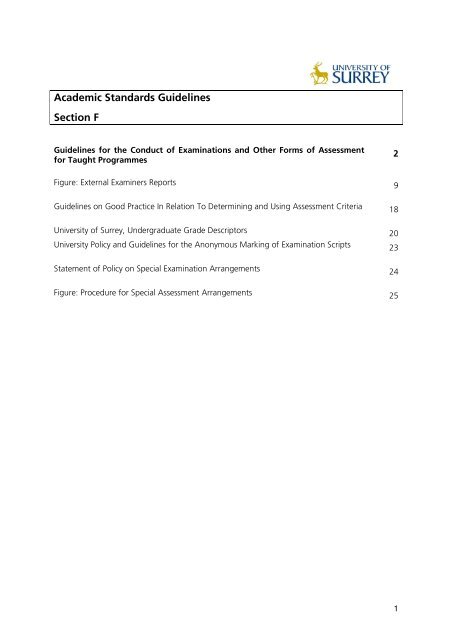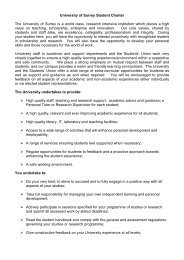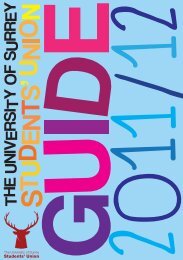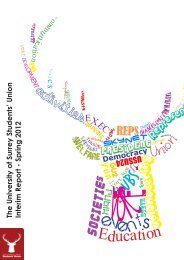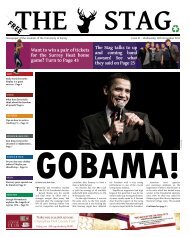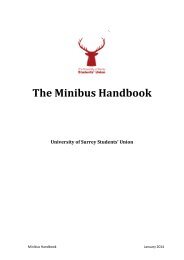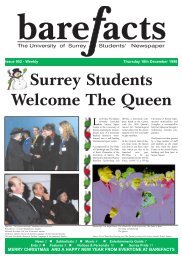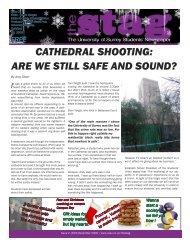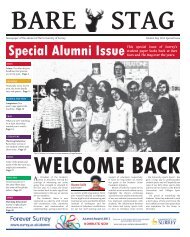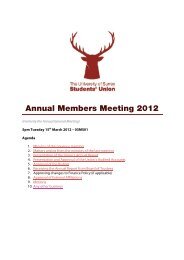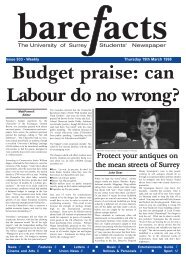asg section f - examinations and other forms of assessment
asg section f - examinations and other forms of assessment
asg section f - examinations and other forms of assessment
Create successful ePaper yourself
Turn your PDF publications into a flip-book with our unique Google optimized e-Paper software.
Academic St<strong>and</strong>ards Guidelines<br />
Section F<br />
Guidelines for the Conduct <strong>of</strong> Examinations <strong>and</strong> Other Forms <strong>of</strong> Assessment<br />
for Taught Programmes<br />
2<br />
Figure: External Examiners Reports 9<br />
Guidelines on Good Practice In Relation To Determining <strong>and</strong> Using Assessment Criteria 18<br />
University <strong>of</strong> Surrey, Undergraduate Grade Descriptors 20<br />
University Policy <strong>and</strong> Guidelines for the Anonymous Marking <strong>of</strong> Examination Scripts 23<br />
Statement <strong>of</strong> Policy on Special Examination Arrangements 24<br />
Figure: Procedure for Special Assessment Arrangements 25<br />
1
Section F: Guidelines for the Conduct <strong>of</strong> Examinations <strong>and</strong> Other<br />
Forms <strong>of</strong> Assessment for Taught Programmes<br />
1 Scope <strong>of</strong> Guidelines<br />
These guidelines are concerned with procedures <strong>and</strong> documentation associated with<br />
the <strong>assessment</strong> <strong>of</strong> undergraduate <strong>and</strong> postgraduate taught programmes, including<br />
<strong>examinations</strong>, coursework, practical work, assignments <strong>and</strong> projects. These guidelines<br />
should be read in conjunction with the University's General Regulations that are set<br />
out in full in the University Calendar:<br />
http://portal.surrey.ac.uk/calendar/generalregs/index.jsp<br />
The pertinent General Regulations for this purpose are:<br />
General Regulations for First Degrees, Diplomas <strong>and</strong> Certificates for Students Pursuing<br />
Modular Programmes <strong>of</strong> Study<br />
General Regulations for the Degree(s) <strong>of</strong> Master (modular <strong>and</strong> non-modular)<br />
Regulations for Practitioner Doctorate (DBA, DClinPrac, EdD, EngD <strong>and</strong> PsychD)<br />
Regulations for Boards <strong>of</strong> Examiners<br />
Regulations for External Examining<br />
Regulations for the Conduct <strong>of</strong> Examinations <strong>and</strong> Other Forms <strong>of</strong> Assessment<br />
Regulations for Boards <strong>of</strong> Studies<br />
2 Board <strong>of</strong> Studies <strong>and</strong> Regulations<br />
2.1 Each Board <strong>of</strong> Studies is responsible for the organisation <strong>and</strong> implementation <strong>of</strong> the<br />
programme(s) <strong>of</strong> study for which it has been established. For each programme <strong>of</strong> study<br />
leading to an award <strong>of</strong> the University there shall be Programme Regulations, approved<br />
by the Quality & St<strong>and</strong>ards Subcommittee, which will include, inter alia:<br />
2.1.1 a clear statement <strong>of</strong> the scheme <strong>of</strong> <strong>assessment</strong> associated with each individual<br />
course/module <strong>and</strong> for the programme <strong>of</strong> study overall;<br />
2.1.2 requirements for the progression <strong>of</strong> students from one stage <strong>of</strong> the<br />
programme to an<strong>other</strong> (including procedures by which any failure to satisfy<br />
the examiners can be redeemed);<br />
2.1.3 requirements for the award <strong>of</strong> the target qualification;<br />
2.1.4 where appropriate, an indication <strong>of</strong> the way in which classifications or<br />
merits/distinctions will be determined;<br />
2.1.5 date approved by the Quality & St<strong>and</strong>ards Subcommittee.<br />
For closely related programmes it may be appropriate to have a single set <strong>of</strong> joint<br />
regulations.<br />
As a matter <strong>of</strong> principle, the Quality & St<strong>and</strong>ards Subcommittee will not approve<br />
retrospective revisions if those revisions might disadvantage students on programme,<br />
unless the students give their unanimous written consent.<br />
2.2 Faculties will be responsible for notifying students <strong>of</strong> the nature <strong>of</strong> any required<br />
coursework or projects, together with the deadlines for the submission <strong>of</strong> that work<br />
(see also Academic St<strong>and</strong>ards Guidelines: Communications with Students).<br />
2
3 Boards <strong>of</strong> Examiners<br />
3.1 For each programme <strong>of</strong> study leading to an award <strong>of</strong> the University, there shall be a<br />
Board <strong>of</strong> Examiners. The Quality & St<strong>and</strong>ards Subcommittee will approve arrangements<br />
for Boards <strong>of</strong> Examiners when programmes are validated or reviewed. When two or<br />
more programmes <strong>of</strong> study share a substantial part in common, the Quality &<br />
St<strong>and</strong>ards Subcommittee may determine that there will be a joint Board <strong>of</strong> Examiners.<br />
3.2 The Board <strong>of</strong> Examiners. is responsible to the Dean <strong>of</strong> Faculty(-ies) responsible for a<br />
programme <strong>of</strong> study <strong>and</strong> for the general conduct <strong>of</strong> the <strong>assessment</strong> for that<br />
programme, in accordance with the General <strong>and</strong> the more specific Programme<br />
Regulations. It will ensure that suitable arrangements are made for the setting, holding<br />
<strong>and</strong> marking <strong>of</strong> <strong>examinations</strong> <strong>and</strong> <strong>other</strong> <strong>forms</strong> <strong>of</strong> <strong>assessment</strong>.<br />
3.3 Regulations for Boards <strong>of</strong> Examiners, governing inter alia the establishment,<br />
membership, terms <strong>of</strong> reference, frequency <strong>and</strong> quorum for meetings for Boards <strong>of</strong><br />
Examiners, are set out in full in the University Calendar:<br />
http://portal.surrey.ac.uk/calendar/generalregs/index.jsp<br />
4 External Examiners<br />
4.1 The purposes <strong>of</strong> the system <strong>of</strong> external examining are:<br />
4.1.1 to ensure, first <strong>and</strong> foremost, that degrees <strong>and</strong> <strong>other</strong> academic qualifications<br />
awarded in similar subjects or disciplines are comparable in st<strong>and</strong>ard in<br />
different universities <strong>and</strong> institutions <strong>of</strong> higher education in the United<br />
Kingdom, though their content may vary;<br />
4.1.2 to ensure that the system <strong>of</strong> <strong>assessment</strong> is fair <strong>and</strong> is fairly operated in the<br />
determination <strong>and</strong>, where appropriate, classification <strong>of</strong> awards made to<br />
students.<br />
4.2 Regulations for External Examining are published annually in the University Calendar:<br />
http://portal.surrey.ac.uk/calendar/generalregs/index.jsp<br />
For each programme <strong>of</strong> study leading to an award <strong>of</strong> the University at least one<br />
external examiner shall be appointed.<br />
4.3 No degree or <strong>other</strong> academic qualification <strong>of</strong> the University may be awarded without<br />
participation in the process <strong>of</strong> examination <strong>and</strong> <strong>assessment</strong> by at least one external<br />
examiner.<br />
4.4 External examiners for taught programmes <strong>of</strong> study are appointed by the Senate<br />
Progression And Conferment Executive, acting with the delegated authority <strong>of</strong> the<br />
University Council. Upon appointment, an external examiner becomes a member <strong>of</strong><br />
the appropriate Board <strong>of</strong> Examiners ex <strong>of</strong>ficio.<br />
4.6 Eligibility for appointment as an external examiner is set out in Regulations for External<br />
Examining. The principles which underpin the rules on eligibility, however, are:<br />
4.6.1 that the individual must be impartial;<br />
4.6.2 that a nominee has, or has had within the previous four years, no close<br />
pr<strong>of</strong>essional link with the programme or Faculty/Department to which he/she<br />
is to be attached, or any close personal connection with staff or students, <strong>and</strong><br />
is not a current student at the University or at one <strong>of</strong> its Associated<br />
Institutions or has been a student within four years prior to the date <strong>of</strong><br />
commencement <strong>of</strong> the proposed appointment as external examiner;<br />
3
4.6.3 that the individual’s academic <strong>and</strong> / or pr<strong>of</strong>essional qualifications <strong>and</strong><br />
experience <strong>of</strong> teaching <strong>and</strong> <strong>assessment</strong> are appropriate in relation to the<br />
programme or specific component <strong>of</strong> the programme for which the<br />
appointment is being made <strong>and</strong> also, where appropriate, that to criteria<br />
specified by pr<strong>of</strong>essional or statutory bodies. [As a guide, a sole appointee as<br />
external examiner should ordinarily be <strong>of</strong> senior lecturer level or above.<br />
However, the University recognises that, in the interests <strong>of</strong> allowing<br />
individuals to gain experience, a less senior appointee may be appointed<br />
normally only when there is already at least one experienced serving external<br />
examiner In some disciplines, it is recognised that there may be only a small<br />
pool <strong>of</strong> eligible c<strong>and</strong>idates; in some instances, it may be appropriate to<br />
appoint an industry-based external examiner];<br />
4.6.4 that the individual has sufficient breadth <strong>of</strong> experience to be able to monitor<br />
<strong>and</strong> make judgements on the comparability <strong>of</strong> academic st<strong>and</strong>ards with<br />
similar programmes at the same level in <strong>other</strong> institutions;<br />
4.6.5 that programmes <strong>and</strong> <strong>assessment</strong> procedures should benefit from scrutiny by<br />
external examiners drawn over time from a wide range <strong>of</strong> institutional/<br />
pr<strong>of</strong>essional contexts <strong>and</strong> traditions;<br />
4.6.6 that appointees have the time to undertake the role <strong>of</strong> external examiner<br />
diligently <strong>and</strong> effectively <strong>and</strong> should therefore not be over-extended by their<br />
duties as external examiner. A nominee, who already holds two or more<br />
similar appointments at undergraduate level will not normally be appointed;<br />
4.6.7 that, wherever possible, appointments should not establish a close reciprocal<br />
external examining arrangements, for example, between programme teams or<br />
Faculties/Departments in a similar discipline. [SPACE may consider an<br />
appointment between institutions/ Faculties, however, where it can be<br />
demonstrated that the reciprocity is not within the same discipline or subject<br />
area <strong>and</strong> is such that neither examiner’s independence is compromised.]<br />
4.7 Before a nomination has been considered <strong>and</strong> agreed by the Board <strong>of</strong> Studies, an<br />
initial, informal approach should be made to the nominee by the Faculty. In so doing,<br />
the Faculty should ascertain that the nominee is eligible for appointment in accordance<br />
with the General Regulations. The nominee should be asked to confirm his/her<br />
eligibility by reading, signing <strong>and</strong> dating the Statement <strong>of</strong> Eligibility form (available<br />
from the Assistant Registrar (Quality Support) tel. 9108).<br />
4.8 Nominations for appointment or re-appointment as external examiners are submitted<br />
for approval to the Senate Progression And Conferment Executive) by the Board <strong>of</strong><br />
Studies. The submission <strong>of</strong> a nomination should be made via the Assistant Registrar<br />
(Quality Support) using the common Nomination Form (available from the Quality<br />
Support Section in Academic Registry), which provides information on:<br />
4.8.1 the nominating Faculty;<br />
4.8.2 the programme <strong>of</strong> study for which responsibility is to be taken (including,<br />
where appropriate, that part or parts <strong>of</strong> the programme or specific modules<br />
for which he/she will take particular responsibility);<br />
4.8.3 his/her title <strong>and</strong> name;<br />
4.8.4 his/her current academic/pr<strong>of</strong>essional position;<br />
4.8.5 his/her current address;<br />
4
4.8.6 sufficient information on the nominee's competence <strong>and</strong> experience to enable<br />
the Senate Progression And Conferment Executive to make an informed<br />
decision [In the case <strong>of</strong> an initial appointment, a nomination should be<br />
accompanied by a signed Eligibility Form <strong>and</strong> a curriculum vitae];<br />
4.8.7 the duration <strong>of</strong> the appointment or re-appointment, up to 3 consecutive years<br />
in the first instance, with automatic progression to one final year 1 ;<br />
4.8.8 the date from which the appointment will be effective (usually the beginning<br />
<strong>of</strong> the academic year in which the appointee will take up his/her duties).<br />
4.9 Once a nomination has been approved, the Assistant Registrar (Quality Support) will<br />
write formally to the individual, <strong>of</strong>fering him/her appointment. The letter <strong>of</strong><br />
appointment will:<br />
4.9.1 specify the award-bearing programme(s) (or subject area(s)) for which the<br />
individual is being appointed, together with any specific areas/modules <strong>of</strong> the<br />
syllabus for which he/she is asked to take particular responsibility;<br />
4.9.2 specify the period <strong>of</strong> appointment <strong>and</strong> starting date;<br />
4.9.3 indicate the fee that the external examiner should receive <strong>and</strong> explain the<br />
University's position with regard to the deduction <strong>of</strong> tax <strong>and</strong> NI at source, etc.;<br />
4.9.4 request the appointee's NI number;<br />
4.9.5 specify as a requirement the submission <strong>of</strong> an annual written report to the<br />
Vice-Chancellor;<br />
4.9.6 indicate that fees will not be paid unless the University receives an annual<br />
written report.<br />
4.10 With the letter <strong>of</strong> appointment, the Assistant Registrar (Quality Support) will send the<br />
new appointee:<br />
4.10.1 A copy <strong>of</strong> the Notes <strong>of</strong> Guidance <strong>and</strong> Regulations for External Examiners,<br />
included within which are the Regulations for External Examining <strong>and</strong><br />
Regulations for Boards <strong>of</strong> Examiners;<br />
4.10.2 a copy <strong>of</strong> the appropriate set(s) <strong>of</strong> General Undergraduate or Postgraduate<br />
Regulations;<br />
4.10.3 information on the level, structure <strong>and</strong> conditions <strong>of</strong> payment <strong>of</strong> fees <strong>and</strong><br />
travel/subsistence allowances (included in the Notes <strong>of</strong> Guidance <strong>and</strong><br />
Regulations for External Examiners).<br />
4.11 Following an individual’s appointment, the University <strong>and</strong> the appropriate Faculty(-ies)<br />
will be responsible for the induction <strong>of</strong> the external examiner <strong>and</strong> for communicating<br />
with him/her throughout the academic year. If induction is not facilitated through the<br />
University Induction Programme for External Examiners, which takes place annually for<br />
newly-appointed external examiners, Faculties should contact external examiners <strong>and</strong><br />
make separate arrangements as necessary.<br />
Induction by the Faculty should include:<br />
4.11.1 sending him/her a copy <strong>of</strong> the up-to-date Programme Regulations;<br />
4.11.2 sending him/her a copy <strong>of</strong> Faculty or Programme H<strong>and</strong>books, which outline<br />
the aims objectives structure <strong>and</strong> content <strong>of</strong> the definitive programme <strong>and</strong><br />
<strong>other</strong> relevant information, including any relevant Subject Benchmark<br />
Statement(s);<br />
1<br />
With effect from 1 September 2002, external examiners are now appointed for three years in the first instance.<br />
Their appointments will be extended automatically for a fourth <strong>and</strong> final year unless the Examinations Office is<br />
advised by the External Examiner or the Faculty/Department to the contrary.<br />
5
4.11.3 the arrangements for submitting schemes <strong>of</strong> <strong>assessment</strong> <strong>and</strong> draft<br />
examination papers for approval;<br />
4.11.4 advice on the schedule <strong>of</strong> <strong>assessment</strong>s for the academic year (if not already<br />
included in the above) <strong>and</strong> the likely timing <strong>of</strong> <strong>examinations</strong>, viva voce<br />
<strong>examinations</strong>, etc, which will be subject to external moderation;<br />
4.11.5 consulting <strong>and</strong> agreeing dates for meetings <strong>of</strong> the Board <strong>of</strong> Examiners <strong>and</strong>, in<br />
particular, for the final meeting;<br />
4.11.6 sending at the appropriate time a report form <strong>and</strong> claim form for fees<br />
(completed by the Faculty) <strong>and</strong> for travel/subsistence expenses.<br />
It is recommended that, if a newly-appointed external examiner is unable to attend<br />
the University’s Induction for External Examiners, he/she be invited by the Faculty to<br />
visit the University to meet with staff <strong>and</strong> students <strong>and</strong> to discuss the programme <strong>and</strong><br />
detailed arrangements for interaction between the external examiner <strong>and</strong> the Faculty.<br />
4.12 At the completion <strong>of</strong> the <strong>assessment</strong> each academic year (normally within six weeks <strong>of</strong><br />
the moderation <strong>of</strong> the final <strong>assessment</strong> for which they are responsible) <strong>and</strong> at the<br />
conclusion <strong>of</strong> their period <strong>of</strong> appointment, external examiners are required to submit<br />
to the Vice-Chancellor a written report on the <strong>assessment</strong> procedures <strong>and</strong> st<strong>and</strong>ards<br />
associated with the programme <strong>of</strong> study for which they are responsible. The report,<br />
employing a common pro-forma, invites comment upon:<br />
4.12.1 the programme <strong>of</strong> study itself (clarity <strong>of</strong> programme aims <strong>and</strong> learning<br />
outcomes; the structure <strong>and</strong> content <strong>of</strong> the programme in relation to the<br />
general aims <strong>and</strong> learning outcomes);<br />
4.12.2 the appropriateness <strong>of</strong> the method(s) <strong>of</strong> <strong>assessment</strong> for the stated learning<br />
outcomes (including knowledge, underst<strong>and</strong>ing, practical skills <strong>and</strong> key<br />
transferable skills, as appropriate) for the programme <strong>and</strong> / or individual<br />
modules;<br />
4.12.3 the congruence <strong>of</strong> the programme/award with external points <strong>of</strong> reference<br />
(e.g., the Framework for Higher Education Qualifications, relevant benchmark<br />
statement(s), pr<strong>of</strong>essional or statutory body st<strong>and</strong>ards);<br />
4.12.4 the appropriateness <strong>of</strong> the marking criteria used, <strong>of</strong> marks awarded <strong>and</strong> the<br />
overall range <strong>of</strong> marks in relation to the marking criteria;<br />
4.12.5 the consistency <strong>of</strong> marking within <strong>and</strong> between the modules/courses<br />
moderated;<br />
4.12.6 quality <strong>and</strong> consistency <strong>of</strong> written feedback to students;<br />
4.12.7 the organisation <strong>and</strong> administration <strong>of</strong> <strong>assessment</strong> procedures <strong>and</strong> the<br />
Faculty’s adherence to procedures, regulations <strong>and</strong> rules for the classification<br />
or division <strong>of</strong> awards.<br />
The pro- forma also includes a checklist which external examiners are asked to<br />
complete.<br />
4.13 The University will expect the Chair <strong>of</strong> the Board <strong>of</strong> Examiners to have invited the<br />
external examiners to make their observations <strong>and</strong> comments verbally <strong>and</strong> directly<br />
during formal meetings <strong>of</strong> the Board. When, for any reason, an external examiner is<br />
unable to attend a meeting <strong>of</strong> a Board <strong>of</strong> Examiners, he/she should be invited, to give<br />
written feedback, prior to the meeting, on the <strong>assessment</strong>s he/she has moderated.<br />
5 External Examiners' Reports<br />
5.1 Figure 8 illustrates the model system within the University for dealing with external<br />
examiners.’ reports described below.<br />
6
5.2 External report pro-formas will be issued to External Examiners by the Quality Support<br />
Section <strong>of</strong> the Academic Registry on appointment, or by Faculties. Copies <strong>of</strong> the<br />
report pro-forma can be accessed on the University web site at:<br />
http://portal.surrey.ac.uk/registry/qaeo/externals<br />
5.3 External examiners’ reports are generally regarded as confidential to the University but<br />
the report pro-forma indicates that they will be made available, for example, to<br />
representatives <strong>of</strong> the QAA <strong>and</strong> OFSTED, to appropriate statutory or pr<strong>of</strong>essional<br />
bodies <strong>and</strong> to members <strong>of</strong> a Periodic Review Panel. External examiners' reports may be<br />
made available to any <strong>other</strong> person or persons outside the University only with the<br />
prior agreement <strong>of</strong> the University <strong>and</strong> <strong>of</strong> the authors. However, in accordance with<br />
the provisions <strong>of</strong> the Data Protection Act 1998, information within a report relating to<br />
named individual students or members <strong>of</strong> staff may also be made available to those<br />
individuals on request but in summary form. External Examiners are advised that<br />
information relating to individuals must be attached to the report as a separate,<br />
confidential annex.<br />
5.4 External examiners' reports will be received on behalf <strong>of</strong> the Vice-Chancellor by the<br />
Senior Assistant Registrar (Quality Support), who will pass them immediately to the<br />
Registrar or his/her nominee. The Registrar or his/her nominee will arrange for copies<br />
to be made for distribution to the appropriate Dean <strong>of</strong> Faculty. The Registrar will draw<br />
to the attention <strong>of</strong> the Deputy Vice Chancellor (Academic Development) any matters <strong>of</strong><br />
particular concern.<br />
5.5 The Dean <strong>of</strong> Faculty will be responsible for ensuring that the reports are considered by<br />
the Board <strong>of</strong> Studies (<strong>and</strong> reported in the Annual Programme Review) <strong>and</strong>, where<br />
appropriate, by the Board <strong>of</strong> Examiners.. The reports may, if Faculties wish, be<br />
considered in summary form by the Board <strong>of</strong> Studies <strong>and</strong> Boards may choose to<br />
consider sensitive issues concerning named members <strong>of</strong> staff or students under<br />
“reserved business”. Actions arising from consideration <strong>of</strong> the external examiners.'<br />
reports should be recorded in the Minutes <strong>of</strong> the Board <strong>of</strong> Studies/Board <strong>of</strong> Examiners<br />
<strong>and</strong> promulgated through the University committees as appropriate. External<br />
examiners should be advised (preferably by letter from the Dean <strong>of</strong> Faculty) <strong>of</strong> the<br />
outcome <strong>of</strong> consideration <strong>of</strong> their reports <strong>and</strong> <strong>of</strong> specific actions which the Board <strong>of</strong><br />
Studies has agreed to take. The Faculty’s response should be copied to the Quality<br />
Support Section, Academic Registry.<br />
5.6 The Dean <strong>of</strong> Faculty will maintain a watching brief over all the programmes <strong>of</strong> study<br />
available within the Faculty. He/she may delegate this function to a person or group <strong>of</strong><br />
persons acting on his/her behalf. The Dean <strong>of</strong> Faculty, the nominated person or group<br />
<strong>of</strong> persons, will be responsible for ensuring that reports are considered <strong>and</strong> acted<br />
upon.<br />
5.7 External examiners' reports will ordinarily be considered as part <strong>of</strong> the documentation<br />
prepared by the Faculty for the periodic review <strong>of</strong> a programme <strong>of</strong> study.<br />
5.8 Upon receipt <strong>of</strong> a completed claim form, the Assistant Registrar (Quality Support) will<br />
authorise fee payment to the external examiner in accordance with the scale <strong>of</strong> fees<br />
approved by the University from time to time. Reimbursement <strong>of</strong> travel <strong>and</strong> subsistence<br />
expenses will also be made by the Assistant Registrar (Quality Support) in accordance<br />
with current University rates. Receipts in support <strong>of</strong> claims for subsistence must be<br />
submitted by the external examiners.<br />
5.9 No payment <strong>of</strong> a fee will be made unless <strong>and</strong> until the University has received an<br />
annual report from the external examiner.<br />
5.10 In the event that an external examiner fails to submit an expected annual report, the<br />
Quality Support Section will issue a reminder.<br />
7
5.11 If an external examiner fails to submit a written report in two consecutive years, the<br />
appointment will be terminated.<br />
Last revised: June 2009<br />
8
Figure 9 – External Examiners Reports<br />
External<br />
Examiner<br />
Quality Support Section<br />
Dean / Boards <strong>of</strong><br />
Studies<br />
Deputy Vice<br />
Chancellor (Ac Dev) /<br />
ULTC<br />
QSS provide<br />
annual summary<br />
report <strong>of</strong> principal<br />
issues arising<br />
from EE Reports<br />
for Q&SS<br />
Q&SS receives <strong>and</strong><br />
considers summary<br />
report <strong>and</strong> agrees<br />
actions as<br />
appropriate<br />
Annual<br />
Summary<br />
Report <strong>of</strong><br />
EE reports<br />
submitted to<br />
ULTC<br />
Serious issues referred to DVC (Ac Dev)<br />
External Examiner<br />
submits Annual<br />
Report <strong>and</strong> Fees<br />
Claim Form<br />
Report <strong>and</strong> Claim<br />
received by QSS<br />
QSS receives,<br />
reads, acknowledges<br />
<strong>and</strong> records Report<br />
on database. QSS<br />
writes to Dean,<br />
drawing attention to<br />
particular concerns<br />
(if applicable).<br />
Dean receives report<br />
<strong>and</strong> refers to Boards <strong>of</strong><br />
Studies for consideration<br />
Feedback to External Examiner (ideally a personal letter from Dean/HoD, copied to QSS)<br />
Key: Q&SS Quality & St<strong>and</strong>ards Subcommittee<br />
QSS Quality Support Section, Academic Registry<br />
ULTC University Learning & Teaching Committee<br />
Copy to QSS<br />
Board <strong>of</strong> Studies<br />
considers Report<br />
<strong>and</strong> agrees action(s)<br />
– Annual<br />
Programme Review<br />
9
6 Examinations Officers<br />
6.1 The University Examinations Officer is responsible for all administrative matters concerning<br />
<strong>examinations</strong>. These include:<br />
6.1.1 the maintenance <strong>and</strong> interpretation <strong>of</strong> the University's General Regulations;<br />
6.1.2 printing externally moderated examination papers <strong>and</strong> related security<br />
arrangements;<br />
6.1.3 preparing timetables for <strong>examinations</strong> <strong>and</strong> making appropriate arrangements for<br />
c<strong>and</strong>idates to sit <strong>examinations</strong> held in central locations;<br />
6.1.4 appointing invigilators on the recommendation <strong>of</strong> Faculties;<br />
6.1.5 presenting results to SPACE/RDC <strong>and</strong>, as appropriate, the Academic St<strong>and</strong>ards<br />
<strong>and</strong> Quality Assurance Committee;<br />
6.1.6 maintaining central records <strong>of</strong> marks <strong>and</strong> results;<br />
6.1.7 issuing <strong>of</strong> certificates to c<strong>and</strong>idates gaining awards <strong>of</strong> the University.<br />
The University Examinations Officer will advise Faculties on any matters concerned with<br />
<strong>examinations</strong> <strong>and</strong> <strong>assessment</strong> generally.<br />
6.2 Each Faculty shall have a designated Examinations Officer who will be responsible to the<br />
Dean <strong>of</strong> Faculty. In a large or complex Faculty there may be two or more Examinations<br />
Officers. Their roles may be split in relation to first degree programmes <strong>and</strong> postgraduate<br />
taught programmes or, in the case <strong>of</strong> modular programmes, the role may be even more<br />
disparate. In all cases, it is important for responsibilities to be clearly defined <strong>and</strong> the<br />
individuals clearly identified.<br />
6.3 Subject to the overall responsibility <strong>of</strong> the Dean <strong>of</strong> Faculty, the responsibilities <strong>of</strong> the<br />
Faculty Examinations Officer(s) will normally include:<br />
6.3.1 preparing draft examination timetables <strong>and</strong> liaising with the University<br />
Examinations Officer;<br />
6.3.2 arranging the preparation <strong>of</strong> draft examination papers;<br />
6.3.3 arranging for the production <strong>of</strong> camera-ready copy <strong>of</strong> externally assessed papers<br />
<strong>and</strong> its delivery to the Academic Registry;<br />
6.3.4 arranging for the checking <strong>of</strong> such papers when printed;<br />
6.3.5 arranging for the printing <strong>and</strong> secure storage <strong>of</strong> examination papers which are<br />
not externally assessed;<br />
6.3.6 proposing the names <strong>of</strong> invigilators for the Faculty's <strong>examinations</strong>;<br />
6.3.7 arranging for papers etc to be marked in accordance with the agreed time<br />
schedule;<br />
6.3.8 preparing mark sheets for meetings <strong>of</strong> the Board <strong>of</strong> Examiners <strong>and</strong> recording<br />
decisions thereon;<br />
6.3.9 conveying mark sheets <strong>and</strong> examiners' recommendations to the Academic<br />
Registry;<br />
6.3.10 retaining records <strong>of</strong> students' results;<br />
6.3.11 informing c<strong>and</strong>idates <strong>of</strong> the results <strong>of</strong> <strong>examinations</strong> <strong>and</strong> <strong>assessment</strong>s.<br />
The Faculty Examinations Officer(s) will be the principal point <strong>of</strong> contact with the<br />
Academic Registry on any matter regarding the Faculty's <strong>examinations</strong> <strong>and</strong> <strong>other</strong><br />
<strong>assessment</strong>s.<br />
10
7 Special Assessment Needs<br />
7.1 The Director <strong>of</strong> Studies should be aware <strong>of</strong> any declared special learning <strong>and</strong> / or<br />
<strong>assessment</strong> needs <strong>of</strong> individual students in relation to the programme <strong>of</strong> study under<br />
his/her direction, for seeking appropriate advice on ways <strong>of</strong> addressing <strong>and</strong> resolving those<br />
needs <strong>and</strong> for advising students <strong>of</strong> the procedures for applying for special examination<br />
arrangements.<br />
7.2 A Special Assessment Arrangements Committee is in place:<br />
• to consider the requirements with respect to <strong>examinations</strong> <strong>and</strong> <strong>other</strong> <strong>forms</strong> <strong>of</strong><br />
<strong>assessment</strong> for students with special needs;<br />
• to consult Faculties <strong>of</strong> the University regarding their students’ special needs;<br />
• to decide what special arrangements should be made for the <strong>assessment</strong> <strong>of</strong> each<br />
student, so that, as far as possible, he or she is neither advantaged or<br />
disadvantaged in comparison with <strong>other</strong> students.<br />
7.3 Students will be invited to make known to the Committee any documented or confirmed<br />
special needs by a published date in the first half <strong>of</strong> each semester. The appropriate<br />
procedure <strong>and</strong> designated dates will be published in the University’s Student H<strong>and</strong>book<br />
<strong>and</strong> in all Programme H<strong>and</strong>books (Academic St<strong>and</strong>ards Guidelines, Section D).<br />
The period <strong>of</strong> notice may be waived in unforeseen <strong>and</strong> exceptional circumstances.<br />
[The University’s Policy on Special Examination Arrangements is set out in<br />
Academic St<strong>and</strong>ards Guidelines, Section D]<br />
8 Setting <strong>of</strong> Examination Length, Papers, Marking <strong>and</strong> Moderation<br />
Formula for maximum examination length (written examination)<br />
8.1 The University sets a maximum limit for written examination length. The scheme gives a<br />
maximum <strong>of</strong> 12 hours <strong>of</strong> exams per year for a student taking 20-credit or 30-credit<br />
modules. Therefore, programmes should use the following formula:<br />
30- credit module = maximum <strong>of</strong> 3 hour exam<br />
20, 15 <strong>and</strong> 10-credit = maximum <strong>of</strong> 2 hour exam<br />
The examination length stated should be inclusive <strong>of</strong> ‘reading time’.<br />
8.2 The maximum time allowed should reflect the possibility that the <strong>assessment</strong> will be very<br />
largely based on the final exam. Broadly speaking, the intensity <strong>of</strong> teaching <strong>and</strong> learning<br />
will be the same, regardless <strong>of</strong> the size <strong>of</strong> the module, so that in principal a 20-credit<br />
module may have 2/3 the learning outcomes <strong>of</strong> a 30-credit module. There is a certain<br />
minimum "granularity" <strong>of</strong> an <strong>assessment</strong>, which argues against very short exams, even for<br />
10-credit modules.<br />
8.3 Associate Deans have authority to authorise exceptions to this level, where there is an<br />
academic necessity (not just an academic argument, or preference). Requests for a<br />
reduction in written examination length should be made via a programme’s Board <strong>of</strong><br />
Studies <strong>and</strong> Associate Deans should report any proposed changes to the Quality &<br />
St<strong>and</strong>ards Subcommittee.<br />
Preparation <strong>of</strong> Examination Papers<br />
11
8.4 The method <strong>of</strong> setting examination papers will vary between Faculties. For some<br />
courses/modules each paper may be set separately by one or two people while, for <strong>other</strong>s,<br />
it may be appropriate to hold a meeting <strong>of</strong> the Examiners to assemble the papers. It is<br />
essential that each complete draft is read by someone <strong>other</strong> than the setter(s) to<br />
ensure that the rubric is correct <strong>and</strong> that the questions are unambiguous <strong>and</strong> in<br />
good English.<br />
8.5 Draft papers for externally-assessed <strong>examinations</strong> must be sent to the external examiner(s)<br />
in adequate time for them to comment on them <strong>and</strong> for any disagreements to be resolved<br />
before the papers need to be printed. An external examiner should receive all the draft<br />
examination papers unless the external examiner has indicated to the Faculty that he/she<br />
wishes to receive only those papers for which he/she has a particular responsibility. When<br />
the answers to questions will be divided into distinct <strong>section</strong>s, a marking scheme should<br />
be sent with the draft papers (<strong>and</strong>, where appropriate, sample solutions or guidance on<br />
expectations) to the external examiner(s).<br />
8.6 The University Examinations Officer will inform Faculties <strong>of</strong> the dates by which papers<br />
should reach him/her for printing. The large volume <strong>of</strong> papers to be printed for the<br />
University <strong>and</strong> the Associated Institutions requires that these deadlines are<br />
observed. The University Examinations Officer should be informed immediately if there<br />
are problems with the compilation <strong>of</strong> particular papers.<br />
8.7 Faculties must make appropriate arrangements for the secure storage <strong>of</strong> draft examination<br />
papers <strong>and</strong> for their safe delivery to the University Examinations Officer. The University<br />
Examinations Officer is thereafter responsible for security arrangements relating to the<br />
printing <strong>and</strong> storage <strong>of</strong> papers.<br />
8.8 The University Library no longer retains printed copies <strong>of</strong> past examination papers, but<br />
makes them available in digital format. Faculties are required to submit all examination<br />
papers electronically to the Library ensuring any supplementary material provided to the<br />
c<strong>and</strong>idate at the time <strong>of</strong> the examination is also digitised <strong>and</strong> submitted with the paper. It<br />
is the responsibility <strong>of</strong> the Faculty to ensure that papers are uploaded <strong>and</strong> that precautions<br />
similar to those pertaining to printed papers are in place to ensure that <strong>examinations</strong><br />
papers are not released publicly before all c<strong>and</strong>idates have sat the paper.<br />
Marking<br />
8.9 The University operates a policy <strong>of</strong> anonymous marking for all written <strong>examinations</strong> (with<br />
effect from 1 September 1996) the details <strong>of</strong> which are set out in Appendix F3. Faculties<br />
are encouraged to consider anonymous marking <strong>of</strong> coursework, where possible <strong>and</strong><br />
practicable.<br />
8.10 The Faculty’s policy <strong>and</strong> practices with regard to marking should be made known to its<br />
internal <strong>and</strong> external examiner(s) alike.<br />
12
8.11 In February 2011 the University Senate approved generic grade descriptors for<br />
undergraduate programmes (Appendix F2). The principles embodied within the<br />
University Grade Descriptors should be a feature <strong>of</strong> assignment-specific marking schemes.<br />
These include:<br />
• clarity as to what constitutes work that represents the whole range <strong>of</strong> available<br />
marks (0% -100%),<br />
• the objectivity <strong>of</strong> the marking schemes, their alignment with the University Grade<br />
Descriptors, their match to the learning outcomes that are being assessed, <strong>and</strong><br />
their relevance to the form <strong>of</strong> <strong>assessment</strong> selected.<br />
Students should be made aware <strong>of</strong> University Grade Descriptors <strong>and</strong> how these relate to<br />
marking schemes for their assignments. It will be essential that, however the University<br />
Grade Descriptors are developed into marking schemes, staff are able to explain these<br />
marking schemes to students in discussions early in the students’ academic careers.<br />
The design <strong>of</strong> challenging assignments (beyond essays <strong>and</strong> exams that test knowledge<br />
recall) must happen alongside the use <strong>of</strong> the University Grade Descriptors <strong>and</strong> clearly<br />
aligned discipline-specific marking schemes since if there is no opportunity within the<br />
assignment for a student to demonstrate their higher level ability then this too will limit<br />
their ability to access marks at the higher end <strong>of</strong> the range.<br />
8.12 The marking <strong>of</strong> a written examination script must not be left entirely to one person. For<br />
examination answers in the form <strong>of</strong> calculations or short notes on a number <strong>of</strong> separate<br />
topics it is sufficient for a second person to check that all parts have been marked <strong>and</strong> that<br />
the marks have been totalled correctly.<br />
8.13 It is a requirement that, for essay-type answers, a sample <strong>of</strong> between 10% <strong>and</strong> 25% <strong>of</strong><br />
scripts (depending on numbers), as a minimum, should be second-marked by an<strong>other</strong><br />
internal marker (although it is desirable that all such answers are double-marked where<br />
practicable). The sample should be representative <strong>of</strong> the range <strong>of</strong> marks <strong>and</strong> include all<br />
borderline fails.<br />
8.14 All projects/dissertations must be double marked “blind” by internal examiners (i.e., that<br />
the marks <strong>of</strong> the first marker are not made known to the second marker in advance).<br />
Marking “blind” should not be confused with anonymous marking (ref. 8.6 above).<br />
8.15 Faculties /Departments should put in place a reliable system for ensuring consistency <strong>of</strong><br />
marking across the Faculty/Department. Criteria for marking must be stated clearly for the<br />
benefit <strong>of</strong> students, internal <strong>and</strong> external markers. This is particularly important where<br />
individual projects, dissertations or theses are concerned since the topics may be diverse.<br />
If, for any given assignment or examination, a number <strong>of</strong> marks are to be awarded<br />
specifically for spelling <strong>and</strong> grammar, the Faculty must make this known to all students in<br />
advance <strong>of</strong> the <strong>assessment</strong>.<br />
8.16 Faculties /Departments must make efforts to ensure uniformity <strong>of</strong> marking across the<br />
range <strong>of</strong> topics. Faculties /Departments should also put in place a mechanism for the<br />
reconciliation <strong>of</strong> marks in cases where internal examiners have recorded very different<br />
marks for the same work, before projects/dissertations are referred to the external<br />
examiner(s) for moderation.<br />
Illegible Scripts<br />
8.17 Occasionally an examiner may be presented with a script which is illegible. In such<br />
instances the following guidance should be used:<br />
8.17.1 the responsibility for determining that a script is illegible resides with the Board<br />
<strong>of</strong> Examiners or through consultation with the Chair <strong>of</strong> the Board <strong>and</strong> the<br />
external examiner(s), never an individual examiner;<br />
13
8.17.2 at its discretion, the Board <strong>of</strong> Examiners may require the c<strong>and</strong>idate, at his/her<br />
own expense, to reproduce the answer in legible form under such conditions <strong>and</strong><br />
within a timescale specified by the Board;<br />
8.17.3 the original script should be retained by the examiner(s) for the purposes <strong>of</strong><br />
comparison;<br />
8.17.4 the Board <strong>of</strong> Examiners has discretion to determine the appropriate course <strong>of</strong><br />
action to be followed, having due regard to: (i) the overall circumstances <strong>and</strong> (ii)<br />
the timescale;<br />
8.17.5 notwithst<strong>and</strong>ing the foregoing clauses, the Board <strong>of</strong> Examiners shall take into<br />
consideration the particular circumstances <strong>of</strong> students who are known to have<br />
special needs <strong>and</strong> may, in cases <strong>of</strong> doubt, advise a student whose script is<br />
deemed illegible to seek pr<strong>of</strong>essional help.<br />
External Moderation<br />
8.18 Faculty Examinations Officers should ascertain from the external examiner(s) in advance<br />
whether he/she wishes to moderate scripts or coursework “blind”. Very <strong>of</strong>ten, however,<br />
the external examiner(s) will wish to underst<strong>and</strong> from remarks on the marked script or<br />
separate sheet the basis on which the internal examiners(s) has awarded the marks.<br />
Coursework may have to be photocopied or temporarily returned to the Faculty to be<br />
available for the external examiner for moderation.<br />
8.19 The external examiner should not be expected to act as a second marker per se or to remark<br />
all examination scripts. Except where the number <strong>of</strong> c<strong>and</strong>idates is very small, the<br />
external examiner will <strong>of</strong>ten moderate only a sample <strong>of</strong> scripts; this sample should include<br />
c<strong>and</strong>idates assessed by internal examiners at the top, middle <strong>and</strong> bottom <strong>of</strong> the range <strong>and</strong><br />
should ordinarily include the scripts <strong>of</strong> c<strong>and</strong>idates who are likely to fail <strong>and</strong> those <strong>of</strong><br />
c<strong>and</strong>idates potentially eligible for the award <strong>of</strong> first class honours or a distinction. If the<br />
external examiner chooses not to receive all the scripts, the nature <strong>and</strong> method <strong>of</strong><br />
selection <strong>of</strong> the sample should be agreed with him/her in advance.<br />
8.20 It is not expected that an external examiner will wish to moderate all assessed coursework<br />
but a selection <strong>of</strong> coursework which makes a significant contribution to the programme<br />
should be available for moderation by the external examiner. The method <strong>of</strong> selection<br />
should be discussed <strong>and</strong> agreed with the external examiner in advance.<br />
It is not unusual for an external examiner to look at a considerable number <strong>of</strong><br />
projects/dissertations, however.<br />
8.21 Programme h<strong>and</strong>books may stipulate that some or all <strong>of</strong> the c<strong>and</strong>idates will be examined<br />
orally <strong>and</strong> / or by performance. If only some c<strong>and</strong>idates are so examined, the external<br />
examiner should be involved in determining the method <strong>of</strong> selection. Even though no oral<br />
or performance-based examination may be specified in the Programme H<strong>and</strong>book, the<br />
General Regulations do provide for any c<strong>and</strong>idate to be examined orally in addition to the<br />
methods <strong>of</strong> <strong>assessment</strong> specified <strong>and</strong> at the discretion <strong>of</strong> the Board <strong>of</strong> Examiners.<br />
14
9 Assessment <strong>and</strong> Feedback to Students<br />
9.1 It is a requirement, when determining the <strong>assessment</strong> requirements for a programme,<br />
that:<br />
• all modules should include at least one opportunity to provide students with<br />
evaluative feedback on their work from which they can judge how they have<br />
performed <strong>and</strong> how they can improve;<br />
• students are provided in advance <strong>of</strong> undertaking an assignment or <strong>other</strong> form <strong>of</strong><br />
<strong>assessment</strong> with the criteria on which their work will be assessed [Guidelines on<br />
good practice in relation to determining <strong>and</strong> using <strong>assessment</strong> criteria are set out<br />
in Appendix F1].<br />
• that <strong>assessment</strong> <strong>of</strong> any module by formal examination shall be restricted to a<br />
maximum <strong>of</strong> 80% <strong>of</strong> the total marks for a given academic level;<br />
9.2 It is also a requirement that:<br />
• for formative assignments <strong>and</strong> exercises on which students would normally expect<br />
to receive feedback, that the module/programme documents <strong>and</strong> relevant<br />
<strong>assessment</strong> guides should specify how long after submission the students will<br />
receive such feedback. Feedback would be given to students within 4 weeks <strong>of</strong><br />
submission <strong>and</strong> this normally would be at least one week before the submission<br />
date for subsequent <strong>and</strong> related assignments.<br />
10 Consideration <strong>and</strong> Promulgation <strong>of</strong> Results<br />
10.1 The Faculty Examination Officer(s) will prepare a mark sheet. The format will vary from one<br />
programme to an<strong>other</strong> <strong>and</strong> the mark sheet may be prepared by computer or manually.<br />
The mark sheet should serve both to provide the Board <strong>of</strong> Examiners with full information<br />
about each c<strong>and</strong>idate <strong>and</strong> to provide a record in future years (for providing references,<br />
transcripts etc). It is best if all marks are expressed as percentages for easy comparison; the<br />
weighting <strong>of</strong> each mark in the overall total should be clearly indicated. Column headings<br />
should be clear <strong>and</strong>, if abbreviations are used to save space, a key should be provided.<br />
See also Examination Office Guidance on the Preparation <strong>of</strong> Results.<br />
10.2 The Board <strong>of</strong> Examiners will consider each c<strong>and</strong>idate in turn. Any agreed change in marks<br />
should be entered on the mark sheet by crossing out the original entry <strong>and</strong> inserting the<br />
new figure. The result for each c<strong>and</strong>idate should be entered when agreed. The Board <strong>of</strong><br />
Examiners may wish to take factors <strong>other</strong> than the total mark into account in determining<br />
whether a c<strong>and</strong>idate has passed or gained a certain class but it is important that equal<br />
consideration is given to all c<strong>and</strong>idates near the same borderline. The Board <strong>of</strong> Examiners<br />
has a duty to consider any mitigating or extenuating circumstances which relate to either<br />
examination or <strong>other</strong> <strong>forms</strong> <strong>of</strong> <strong>assessment</strong> which may have impaired a c<strong>and</strong>idate's<br />
performance (see Section F <strong>of</strong> the Regulations). The Board <strong>of</strong> Examiners must also consider<br />
the situation <strong>of</strong> c<strong>and</strong>idates who were absent from an examination [including those who<br />
were entitled to resit but who failed to do so] <strong>and</strong> make recommendations. When all<br />
recommendations have been decided for all c<strong>and</strong>idates, the Chair should sign the mark<br />
sheet, as should the external examiner(s) in the case <strong>of</strong> externally assessed <strong>examinations</strong>.<br />
10.3 The Dean <strong>of</strong> Faculty is responsible for informing c<strong>and</strong>idates <strong>of</strong> the results <strong>of</strong> <strong>examinations</strong><br />
<strong>and</strong> <strong>other</strong> <strong>forms</strong> <strong>of</strong> <strong>assessment</strong>. This may be done before the results have been approved<br />
by the Senate Progression And Conferment Executive [<strong>and</strong> when awards are to be made],<br />
provided the list or letters make it clear that the results are provisional <strong>and</strong> may be subject<br />
to change.<br />
15
10.4 A list <strong>of</strong> the recommendations <strong>of</strong> the Board <strong>of</strong> Examiners, together with a signed copy <strong>of</strong><br />
the mark sheet, should be brought to the University Examinations Officer as soon as<br />
possible after the conclusion <strong>of</strong> the meeting. When awards are to be made, the<br />
recommendations are entered into the computer <strong>and</strong> the lists provided for the Senate<br />
Progression And Conferment Executive <strong>and</strong> Senate are printed by computer. This ensures<br />
that the University records, the Gazette <strong>and</strong> the certificates are the same but does mean<br />
the computer lists require careful checking by Faculties. The processing <strong>and</strong> storage <strong>of</strong><br />
c<strong>and</strong>idates' marks by computer or <strong>other</strong> means must accord with the provisions <strong>of</strong> the<br />
Data Protection Act 1998.<br />
10.5 Each c<strong>and</strong>idate shall be told his or her marks on a confidential basis if he or she so<br />
requests. In accordance with the Data Protection Act 1998 students may, if they wish, be<br />
shown their marked examination scripts. Scripts may not be returned to c<strong>and</strong>idates on a<br />
permanent basis.<br />
11 Retention <strong>of</strong> Examination Scripts / Dissertations<br />
11.1 Faculties must make arrangements to retain marked examination scripts for at least 12<br />
months after they have been considered by the Board <strong>of</strong> Examiners. Scripts should be<br />
retained securely (e.g. in a locked filing cabinet) <strong>and</strong> access accorded only to academic <strong>and</strong><br />
<strong>other</strong> staff with a legitimate right to consult them.<br />
11.2 In the event that a student submits a formal appeal to the University, Faculties should<br />
retain copies <strong>of</strong> the appellant’s <strong>examinations</strong> scripts, coursework, dissertation or thesis,<br />
<strong>and</strong> <strong>other</strong> documents until the appeal has run its course.<br />
11.3 Faculties are advised, in the approach to Institutional or <strong>other</strong> form <strong>of</strong> Audit by the QAA,<br />
to an accreditation visit by a pr<strong>of</strong>essional body or to some <strong>other</strong> form <strong>of</strong> review to ensure<br />
that they have available a representative sample <strong>of</strong> assessed work across the full marking<br />
spectrum.<br />
11.4 Other than 10.2 <strong>and</strong> 10.3 above, the University does not require Faculties to retain copies<br />
<strong>of</strong> undergraduate dissertations, project reports or <strong>other</strong> <strong>forms</strong> <strong>of</strong> substantive coursework.<br />
11.5 The University Library will only retain Master’s dissertations, with the exception <strong>of</strong> M.Phil<br />
dissertations for a period <strong>of</strong> eight years. Faculties wishing to retain theses for a longer<br />
period than this should do so on a Departmental basis.<br />
11.6 Faculties are required to adhere to the principles <strong>of</strong> the Data Protection Act 1998, viz:<br />
11.6.1 personal data shall be processed fairly <strong>and</strong> lawfully;<br />
11.6.2 personal data shall be obtained only for one or more specified <strong>and</strong> lawful<br />
purposes, <strong>and</strong> shall not be further processed in any manner incompatible with<br />
that purpose or those purposes;<br />
11.6.3 personal data shall be adequate, relevant <strong>and</strong> not excessive in relation to the<br />
purpose or purposes for which they are processed;<br />
11.6.4 personal data shall be accurate <strong>and</strong>, where necessary, kept up to date;<br />
11.6.5 personal data processed for any purpose shall not be kept for longer than is<br />
necessary for that purpose or those purposes;<br />
11.6.6 personal data shall be processed in accordance with the rights <strong>of</strong> data subjects<br />
under the Act;<br />
11.6.7 appropriate technical <strong>and</strong> organisational measures shall be taken against<br />
unauthorised or unlawful processing <strong>of</strong> personal data <strong>and</strong> against accidental loss<br />
or destruction <strong>of</strong>, or damage to, personal data;<br />
16
11.6.8 personal data shall not be transferred to a country or territory outside the<br />
European Economic Area unless that country or territory ensures an adequate<br />
level <strong>of</strong> protection for the rights <strong>and</strong> freedoms <strong>of</strong> data subjects in relation to the<br />
processing <strong>of</strong> personal data.<br />
Approved by Senate: October 1992<br />
Last Revised: July 2011<br />
17
Appendix F1: Guidelines on Good Practice In Relation To<br />
Determining <strong>and</strong> Using Assessment Criteria<br />
The key question when setting an assignment should be “What, exactly, do I want the students<br />
to demonstrate about their learning in this assignment” Careful consideration <strong>of</strong> this question<br />
should ensure alignment between the assignment tasks <strong>and</strong> the intended module outcomes,<br />
<strong>and</strong> facilitate the development <strong>of</strong> clear <strong>assessment</strong> criteria that may be made explicit for the<br />
benefit <strong>of</strong> students.<br />
Assessment criteria specify what a student must be able to do to achieve a pass, or to achieve a<br />
particular grade. The use <strong>of</strong> appropriate criteria facilitates the provision <strong>of</strong> feedback to students<br />
<strong>and</strong> may also link to a self-<strong>assessment</strong> cover sheet where the students indicate how their<br />
answers seek to meet the dem<strong>and</strong>s <strong>of</strong> the assignment.<br />
Supposing that you decide that the following areas need to be evidenced (the particular traits<br />
will, <strong>of</strong> course, differ according to the subject area <strong>and</strong> type <strong>of</strong> <strong>assessment</strong>):<br />
• Knowledge <strong>and</strong> underst<strong>and</strong>ing <strong>of</strong> particular content<br />
• Critical analysis <strong>of</strong> conflicting evidence<br />
• A range <strong>of</strong> sources used appropriately<br />
• A well-structured argument<br />
• Language <strong>and</strong> expression<br />
These may be incorporated into a matrix which shows how well each <strong>of</strong> these traits is<br />
demonstrated using a scale from 1-5.<br />
Assignments can be graded by scoring them for each factor on the five point scale. Overall<br />
percentages are derived by applying a weighting to the factor relative to its importance, so that<br />
the total possible marks are 100. So, for example, critical analysis <strong>of</strong> conflicting evidence may be<br />
weighted x5 while underst<strong>and</strong>ing <strong>of</strong> relevant content is weighted x3, <strong>and</strong> so on. Again, the<br />
relative weighting <strong>of</strong> categories will depend on the level at which the student is studying.<br />
A sample matrix is shown below 2 :<br />
Knowledge Critical Sources Argument Language<br />
1 Little or no<br />
evidence <strong>of</strong><br />
familiarity with<br />
content <strong>of</strong><br />
module<br />
Little or no<br />
evidence <strong>of</strong> critical<br />
evaluation <strong>of</strong><br />
material<br />
Sources not<br />
used to<br />
support<br />
substantive<br />
assertions or<br />
argument<br />
Either no<br />
discernible, or<br />
seriously<br />
flawed<br />
academic<br />
argument<br />
The<br />
assignment<br />
has<br />
unacceptable<br />
failings in<br />
structure <strong>and</strong> /<br />
or clarity <strong>of</strong><br />
written<br />
expression<br />
2<br />
This draws on an example provided by James Atherton, De Montfort University.<br />
18
2 Evidence that<br />
relevant module<br />
content is broadly<br />
understood, but<br />
with significant<br />
gaps or<br />
misapprehensions<br />
Evidence <strong>of</strong> limited<br />
critical evaluation<br />
in some areas,<br />
with some lost<br />
opportunities or<br />
misunderst<strong>and</strong>ings<br />
Limited <strong>and</strong><br />
uncritical use<br />
<strong>of</strong> a restricted<br />
range <strong>of</strong><br />
sources<br />
Argument is<br />
sometimes<br />
trivial,<br />
confused or<br />
flawed<br />
The<br />
assignment<br />
has failings in<br />
structure <strong>and</strong> /<br />
or clarity <strong>of</strong><br />
written<br />
expression,<br />
which impair<br />
its capacity to<br />
communicate<br />
3 Evidence that<br />
relevant module<br />
content is<br />
adequately<br />
understood, but<br />
with some gaps or<br />
misapprehensions<br />
4 Evidence <strong>of</strong><br />
extensive<br />
knowledge <strong>of</strong> the<br />
relevant module<br />
content, without<br />
major<br />
misapprehensions<br />
5 Evidence <strong>of</strong><br />
superior,<br />
comprehensive<br />
<strong>and</strong> deep<br />
knowledge <strong>of</strong> the<br />
relevant module<br />
content<br />
Evidence <strong>of</strong> a<br />
general critical<br />
stance, although<br />
some material not<br />
evaluated<br />
Evidence <strong>of</strong> good<br />
critical<br />
appreciation <strong>and</strong><br />
evaluation <strong>of</strong><br />
relevant theory<br />
<strong>and</strong> research <strong>and</strong> a<br />
systematic attempt<br />
to relate it to the<br />
topic<br />
Evidence <strong>of</strong><br />
thorough critical<br />
appreciation <strong>and</strong><br />
evaluation <strong>of</strong><br />
relevant theory<br />
<strong>and</strong> research <strong>and</strong> a<br />
systematic <strong>and</strong><br />
creative attempt to<br />
relate it to the<br />
topic<br />
Use <strong>of</strong> a range<br />
<strong>of</strong> appropriate<br />
sources, but<br />
without critical<br />
evaluation, or<br />
missing some<br />
significant<br />
items<br />
Use <strong>of</strong> a wide<br />
range <strong>of</strong><br />
appropriate<br />
sources with<br />
some critical<br />
awareness <strong>of</strong><br />
their status<br />
<strong>and</strong> relevance<br />
Use <strong>of</strong> a wide<br />
range <strong>of</strong><br />
appropriate<br />
sources,<br />
indicating<br />
personal<br />
research, <strong>and</strong><br />
with full critical<br />
awareness <strong>of</strong><br />
their status<br />
<strong>and</strong> relevance<br />
Argument is<br />
let down by<br />
occasional<br />
confusion or<br />
flaws<br />
Argument is<br />
sound <strong>and</strong><br />
substantial,<br />
although not<br />
original<br />
Argument is<br />
sound <strong>and</strong><br />
substantial,<br />
with significant<br />
elements <strong>of</strong><br />
originality<br />
While the<br />
assignment<br />
has some<br />
failings in<br />
structure <strong>and</strong> /<br />
or clarity <strong>of</strong><br />
written<br />
expression,<br />
these do not<br />
impair its<br />
capacity to<br />
communicate<br />
A generally<br />
well-structured<br />
<strong>and</strong> expressed<br />
assignment,<br />
which<br />
communicates<br />
clearly<br />
An assignment<br />
whose clear<br />
structure <strong>and</strong><br />
expression<br />
significantly<br />
enhances its<br />
argument<br />
There is freeware available (see, for example, http://www.circle-<strong>of</strong>-excellence.com – Free<br />
Downloads – MarkThis Pro 3.0) which will do the calculations for you <strong>and</strong> also generate a<br />
student feedback sheet which may be further individualised by providing each student with a<br />
comment indicating what they need to do next to improve.<br />
19
Appendix F2: University <strong>of</strong> Surrey, Undergraduate Grade Descriptors<br />
Comm<strong>and</strong> <strong>of</strong> the Subject<br />
90-100 • Demonstrates a breadth <strong>and</strong> depth <strong>of</strong> substantive<br />
knowledge that is exceptional <strong>and</strong> informed by<br />
the highest level <strong>of</strong> scholarship<br />
• Excellent integration <strong>of</strong> the full range <strong>of</strong><br />
appropriate principles, theories, evidence <strong>and</strong><br />
techniques<br />
• Goes beyond the material displaying exceptional<br />
flair in tackling issues identified<br />
Subject Specific Skills <strong>and</strong><br />
Practices<br />
• Exceptional application <strong>of</strong> theoretical<br />
<strong>and</strong> technical knowledge to achieve<br />
learning outcomes<br />
• Exceptional pr<strong>of</strong>essional presentation<br />
using an appropriate range <strong>of</strong><br />
resources <strong>and</strong> reflecting pr<strong>of</strong>essional<br />
norms.<br />
Scholarly <strong>and</strong> Pr<strong>of</strong>essional Skills <strong>and</strong> Attitudes<br />
Work that influences how academics <strong>and</strong> students think about their<br />
discipline through:<br />
• Being original within the discipline on the basis <strong>of</strong> its excellence;<br />
• Achieving the highest level <strong>of</strong> compelling, coherent <strong>and</strong> concise<br />
argument attainable within the level <strong>of</strong> study;<br />
• Using a full range <strong>of</strong> high quality sources to inform but not dominate<br />
the argument<br />
80-89 • Demonstrates a breadth <strong>and</strong> depth <strong>of</strong> substantive<br />
knowledge that is comprehensive, accurate,<br />
relevant <strong>and</strong> informed by advanced scholarship<br />
• Excellent integration <strong>of</strong> a full range <strong>of</strong> appropriate<br />
principles, theories, evidence <strong>and</strong> techniques<br />
• Goes beyond the material with excellent<br />
conceptualisation which is original, innovative<br />
<strong>and</strong>/or insightful<br />
70-79 • Informed by a breadth <strong>and</strong> depth <strong>of</strong> substantive<br />
knowledge that is comprehensive, accurate,<br />
relevant with an awareness <strong>of</strong> advanced<br />
scholarship<br />
• Very good integration <strong>of</strong> a full range <strong>of</strong><br />
appropriate principles, theories, evidence <strong>and</strong><br />
techniques<br />
• Goes beyond the material with very good<br />
conceptualisation which is <strong>of</strong>ten original,<br />
innovative <strong>and</strong>/or insightful<br />
60-69 • Demonstrates a breadth <strong>and</strong> depth <strong>of</strong> substantive<br />
knowledge that is comprehensive <strong>and</strong> accurate<br />
• Good integration <strong>of</strong> a range <strong>of</strong> appropriate<br />
principles, theories, evidence <strong>and</strong> techniques<br />
• Some good insight into the material<br />
• Excellent <strong>and</strong> original application <strong>of</strong><br />
theoretical <strong>and</strong> technical knowledge<br />
to achieve learning outcomes<br />
• Excellent pr<strong>of</strong>essional presentation<br />
using an appropriate range <strong>of</strong><br />
resources <strong>and</strong> reflecting pr<strong>of</strong>essional<br />
norms.<br />
• Consistently applies theoretical <strong>and</strong><br />
technical knowledge to achieve<br />
learning outcomes with some<br />
originality<br />
• Very good pr<strong>of</strong>essional presentation<br />
using an appropriate range <strong>of</strong><br />
resources <strong>and</strong> reflecting pr<strong>of</strong>essional<br />
norms.<br />
• Clear evidence <strong>of</strong> the application <strong>of</strong><br />
theoretical <strong>and</strong> technical knowledge<br />
to achieve learning outcomes with<br />
few obvious flaws<br />
• Pr<strong>of</strong>essional presentation using a<br />
good range <strong>of</strong> resources <strong>and</strong><br />
reflecting pr<strong>of</strong>essional norms.<br />
Work that has real potential to influence how academics <strong>and</strong> students<br />
may think about their discipline through:<br />
• Being original on the basis <strong>of</strong> its excellence in the context <strong>of</strong> the level<br />
<strong>of</strong> study;<br />
• A compelling, coherent <strong>and</strong> concise argument;<br />
• Drawing on a full range <strong>of</strong> high quality sources.<br />
Work that has some potential to influence how academics <strong>and</strong> students<br />
may think about their discipline through:<br />
• Some originality on the basis <strong>of</strong> its excellence in the context <strong>of</strong> the<br />
level <strong>of</strong> study;<br />
• Arguments which are coherent, concise <strong>and</strong> frequently compelling;<br />
• Drawing on a wide range <strong>of</strong> high quality sources.<br />
Work that critically engages with current thinking in the discipline<br />
through:<br />
• Clear differentiation between the quality <strong>and</strong> appropriateness <strong>of</strong><br />
sources used;<br />
• Arguments which are coherent <strong>and</strong> concise <strong>and</strong> <strong>of</strong>fer robust<br />
conclusions;<br />
• The development <strong>of</strong> a good analytical model<br />
20
50-59 • Demonstrates an adequate breadth <strong>and</strong> depth <strong>of</strong><br />
substantive knowledge but with only a few errors<br />
or omissions<br />
• Demonstrates an adequate underst<strong>and</strong>ing <strong>of</strong> a<br />
range <strong>of</strong> appropriate principles, theories, evidence<br />
<strong>and</strong> techniques<br />
• Shows some ability to critically engage with the<br />
material<br />
40-49 • Incomplete breadth <strong>and</strong> depth <strong>of</strong> substantive<br />
knowledge with some errors or omissions<br />
• Demonstrates an awareness <strong>of</strong> appropriate<br />
principles, theories, evidence <strong>and</strong> techniques<br />
• Limited <strong>and</strong> underdeveloped critical engagement<br />
with the material<br />
30-39 • Little relevant knowledge, which is minimal in its<br />
breadth <strong>and</strong> depth with major errors or omissions<br />
• Minimal awareness <strong>of</strong> appropriate principles,<br />
theories, evidence <strong>and</strong> techniques<br />
• Fails to demonstrate sufficient critical engagement<br />
with the material<br />
20-29 • Does not demonstrate even a basic underst<strong>and</strong>ing<br />
<strong>of</strong> the subject matter<br />
• Insufficient awareness <strong>of</strong> appropriate principles,<br />
theories, evidence <strong>and</strong> techniques<br />
• Little evidence <strong>of</strong> critical engagement with the<br />
material<br />
10-19 • Demonstrates confusion over the subject matter<br />
• Little awareness <strong>of</strong> appropriate principles,<br />
theories, evidence <strong>and</strong> techniques<br />
• No evidence <strong>of</strong> critical engagement with the<br />
material<br />
• Adequate application <strong>of</strong> theoretical<br />
<strong>and</strong> technical knowledge to achieve<br />
learning outcomes although with<br />
some obvious flaws<br />
• Presentation which adequately<br />
reflects relevant pr<strong>of</strong>essional norms<br />
• Demonstrates limited ability to put<br />
theory into practice<br />
• Demonstrates limited technical ability<br />
but lacking theoretical <strong>and</strong> reflective<br />
insights<br />
• Presentation with reflects<br />
pr<strong>of</strong>essional practice in a limited<br />
manner<br />
• Demonstrates a minimal ability to<br />
meet learning outcomes in the grasp<br />
<strong>of</strong> both theory <strong>and</strong> technical<br />
knowledge<br />
• Presentation which displays little<br />
more than cursory attention to<br />
pr<strong>of</strong>essional norms<br />
• Lacks any real application <strong>of</strong> skills to<br />
meet learning outcomes<br />
• Fails to demonstrate any substantive<br />
meeting <strong>of</strong> learning outcomes<br />
• No real attention to the disciplinary<br />
norms <strong>of</strong> presentation<br />
• Fails to demonstrate the use <strong>of</strong> skills<br />
to meet learning outcomes<br />
• Fails to demonstrate any substantive<br />
meeting <strong>of</strong> learning outcomes<br />
• No real attention to the disciplinary<br />
norms <strong>of</strong> presentation<br />
Work that accurately reports on current thinking in the discipline through:<br />
• The repetition <strong>of</strong>, rather than critical engagement with, limited<br />
sources;<br />
• Adequate differentiation between the quality <strong>and</strong> appropriateness <strong>of</strong><br />
sources used;<br />
• Drawing adequate conclusions which do not always fully reflect the<br />
complexity <strong>of</strong> the subject matter;<br />
• An adequate if unsophisticated analytical model.<br />
Work that <strong>of</strong>fers a limited underst<strong>and</strong>ing <strong>of</strong> thinking in the discipline<br />
through:<br />
• Limited attention paid to the quality, range <strong>and</strong> appropriateness <strong>of</strong><br />
sources used;<br />
• Poorly informed opinion led work which lacks a clear evidence base;<br />
• A limited <strong>and</strong> underdeveloped structure <strong>of</strong> argument;<br />
• Work that is <strong>of</strong> limited coherence <strong>and</strong> clarity.<br />
Work that <strong>of</strong>ten misrepresents or misunderst<strong>and</strong>s thinking in the discipline<br />
through:<br />
• Minimal attention paid to the quality, range <strong>and</strong> appropriateness <strong>of</strong><br />
sources used;<br />
• Poorly informed opinion led work with a minimal evidence base;<br />
• No real underlying structure <strong>of</strong> argument;<br />
• Work that is frequently confused <strong>and</strong> incoherent.<br />
Work that fundamentally misrepresents or misunderst<strong>and</strong>s thinking in the<br />
discipline through:<br />
• A lack <strong>of</strong> attention to the quality, range <strong>and</strong> appropriateness <strong>of</strong><br />
sources used;<br />
• Poorly informed opinion-led work rather than evidence based<br />
argument;<br />
• No real underlying structure <strong>of</strong> argument;<br />
Work that completely misrepresents or misunderst<strong>and</strong>s thinking in the<br />
discipline through:<br />
• Inadequacy <strong>of</strong> sources used;<br />
• Unsubstantiated assertion with no evidence base<br />
• Failure to structure the argument being presented;<br />
21
0-9 • Demonstrates mainly ignorance <strong>of</strong> the subject<br />
matter by presenting information <strong>of</strong> minimal<br />
relevance.<br />
• Little or no awareness <strong>of</strong> appropriate principles,<br />
theories, evidence <strong>and</strong> techniques.<br />
• Learning outcomes not met<br />
• No real attention to any norms <strong>of</strong><br />
presentation.<br />
Work that completely misrepresents or misunderst<strong>and</strong>s thinking in the<br />
discipline through:<br />
• Absence or misuse <strong>of</strong> sources;<br />
• Work that is confused <strong>and</strong> incoherent.<br />
22
Appendix F3: University Policy <strong>and</strong> Guidelines for the Anonymous<br />
Marking <strong>of</strong> Examination Scripts<br />
1.1 A policy <strong>of</strong> anonymous marking for all written <strong>examinations</strong> was introduced in 1996-<br />
97 (SEN 6/95: Minute 73 refers). Faculties may decide whether the principle should be<br />
extended to any <strong>other</strong> <strong>forms</strong> <strong>of</strong> <strong>assessment</strong>.<br />
1.2 Each c<strong>and</strong>idate will be expected to identify his or her script by means <strong>of</strong> the University<br />
Registration Number (URN); this is printed on the library card. It has been agreed that it<br />
is desirable to allocate individual seat numbers to c<strong>and</strong>idates but the Academic Registry<br />
cannot do this <strong>and</strong> produce place cards at present. Those Faculties which decide to<br />
produce their own place cards should include the c<strong>and</strong>idate's number in addition to<br />
the name. Owing to the possibility <strong>of</strong> a c<strong>and</strong>idate writing a wrong or illegible number<br />
on a script, answer books are used which enable the c<strong>and</strong>idate to write his or her<br />
name on the script <strong>and</strong> then seal down the corner to conceal it; if necessary this corner<br />
can be slit open to reveal the c<strong>and</strong>idate's name. Supplies <strong>of</strong> answer books with 16<br />
ruled pages (as at present) <strong>and</strong> small answer books with 8 ruled pages are available. A<br />
c<strong>and</strong>idate should write his or her number on any supplementary material, such as<br />
graph paper, <strong>and</strong> attach it to the answer book. For a multiple choice examination there<br />
should be a space for both the c<strong>and</strong>idate's number <strong>and</strong> name; the fact that the name<br />
cannot be concealed is <strong>of</strong> no importance since each answer is either right or wrong<br />
<strong>and</strong> marking is an automatic process.<br />
1.3 Attendance lists should be prepared by Faculties with the c<strong>and</strong>idates' names in<br />
alphabetical order but also showing each c<strong>and</strong>idate's number; such lists can be<br />
produced from the MIS database. Reference can be made to such a list if a c<strong>and</strong>idate<br />
does not know his or her number. For <strong>examinations</strong> at level HE2 <strong>and</strong> above, one copy<br />
<strong>of</strong> the list, marked to show the c<strong>and</strong>idates present, must be returned to the University<br />
Examinations Office <strong>and</strong> an<strong>other</strong> retained by the Faculty. Such a list must not be<br />
included in the bundle <strong>of</strong> scripts for marking.<br />
1.4 Scripts must remain identified only by number at least until they have been fully<br />
marked internally.<br />
1.5 The method <strong>of</strong> preparation <strong>of</strong> mark sheets will depend on whether this is done<br />
manually or by using a computer. If a computer is used then the c<strong>and</strong>idates should be<br />
arranged in numerical order to facilitate entering marks. The computer can, <strong>of</strong> course,<br />
be programmed to print mark sheets in any desired format for an examiners' meeting.<br />
For a meeting at which classes <strong>of</strong> degrees are to be determined, it may be <strong>of</strong><br />
advantage if the lists <strong>of</strong> c<strong>and</strong>idates are arranged in rank order according to the total<br />
mark. In all cases the agreed mark sheet submitted to the University Examinations<br />
Office after the examiners' meeting must list the c<strong>and</strong>idates in alphabetical order.<br />
1.6 Great care must be taken to avoid entering a mark against the wrong c<strong>and</strong>idate,<br />
whatever system is used to identify scripts.<br />
1.7 Each Faculty may decide whether c<strong>and</strong>idates should be identified by name throughout<br />
the examiners' meeting(s). When classes <strong>of</strong> degrees are being determined the best<br />
practice is to decide them initially, with the c<strong>and</strong>idates identified only by number. It is,<br />
however, necessary to identify c<strong>and</strong>idates by name to make any allowances for illness<br />
or <strong>other</strong> special circumstances.<br />
1.8 Each c<strong>and</strong>idate is entitled to be told his or her marks for each examination or <strong>other</strong><br />
form <strong>of</strong> <strong>assessment</strong> but a c<strong>and</strong>idate may not be told <strong>other</strong> individual c<strong>and</strong>idates'<br />
marks. A Faculty may find it convenient to provide this information by displaying a list<br />
<strong>of</strong> marks with the c<strong>and</strong>idates identified solely by number.<br />
23
Appendix F4: Statement <strong>of</strong> Policy on Special Examination <strong>and</strong><br />
Assessment Arrangements<br />
1 The University is committed to providing equality <strong>of</strong> opportunity in academic<br />
<strong>assessment</strong> for all students. This policy is intended to provide a clear statement <strong>of</strong> the<br />
University's specific commitments in relation to the reasonable adjustment to the<br />
examination arrangements for those students with recognised special needs or<br />
disabilities. It should be read in conjunction with the Student Disability Policy.<br />
2 The University will comply with the Special Educational Needs <strong>and</strong> Disability Act (2001)<br />
<strong>and</strong> Disability Discrimination Act: Part 4 (2001) with respect to making reasonable<br />
adjustments to <strong>assessment</strong> or examination arrangements.<br />
3 The University will provide reasonable adjustments to <strong>assessment</strong> <strong>and</strong> examination<br />
arrangements to provide equality <strong>of</strong> opportunity for students with special needs or<br />
disability to demonstrate their achievement <strong>of</strong> the learning outcomes.<br />
4 Reasonable adjustments to <strong>assessment</strong> arrangements will involve the provision <strong>of</strong><br />
appropriate resources, <strong>forms</strong> <strong>of</strong> <strong>assessment</strong> <strong>and</strong>, where necessary, additional time in<br />
time-constrained <strong>assessment</strong>s.<br />
5 The University will not normally adjust the criteria or learning outcomes for an<br />
<strong>assessment</strong>. However, in exceptional circumstances it may be necessary to make<br />
adjustments to a student’s programme <strong>of</strong> study, where it would <strong>other</strong>wise be<br />
impossible for the student to complete the learning outcomes. As is prescribed in the<br />
Code <strong>of</strong> Practice published by the Disability Rights Commission.<br />
6 Recommendations for the adjustment to arrangements for <strong>assessment</strong> <strong>and</strong> / or<br />
examination will be made by Additional Learning Support (ALS). Approval <strong>of</strong> the<br />
recommendation should be obtained prior to the implementation <strong>of</strong> any adjustment.<br />
The University Examinations Officer shall make special arrangements for the<br />
examination <strong>of</strong> a c<strong>and</strong>idate, which the Special Assessment Arrangements Committee<br />
approves – as is defined in the General Regulations. The terms <strong>of</strong> reference for the<br />
Committee are listed in The University Calendar. A flow chart <strong>of</strong> the process <strong>of</strong> an<br />
application follows <strong>section</strong> 7 below.<br />
7 Where it is not practically feasible to provide special examination arrangements, due to<br />
the lateness <strong>of</strong> recommendation or limitation <strong>of</strong> resources, the circumstances will be<br />
reported formally to the appropriate Board <strong>of</strong> Examiners by the Special Examinations<br />
Arrangements Committee. The Board will be informed <strong>of</strong> the recommendation for<br />
special examination arrangement for the student <strong>and</strong> be asked to take this into<br />
account when considering the progress <strong>of</strong> or award for the student.<br />
Dean <strong>of</strong> Students (4.1.05)<br />
24
Figure 10 – Procedure for Special Assessment Arrangements<br />
Students informed <strong>of</strong> how to apply for<br />
special examination arrangements<br />
<strong>and</strong> approach ALS, by specified date,<br />
for <strong>assessment</strong>.<br />
Student’s application is considered by<br />
ALS staff - evidence is gathered <strong>and</strong><br />
recommendation for special<br />
<strong>assessment</strong> arrangement (SAA) is<br />
made.<br />
ALS submit<br />
recommendation for<br />
SAA to SAAC<br />
SAAC approves<br />
recommendation <strong>and</strong><br />
forwards to Registry<br />
ALS inform<br />
student <strong>of</strong> SAA<br />
agreed<br />
Registry forward<br />
recommendations to<br />
Faculty Examination<br />
Officers<br />
Faculty Examination<br />
Officers implement<br />
Faculty/Departmentbased<br />
arrangements<br />
where approved at<br />
SAAC<br />
Exceptionally late applications<br />
may be considered by the<br />
Chair <strong>of</strong> SAAC in consultation<br />
with ALS, Registry <strong>and</strong><br />
Faculties<br />
25


